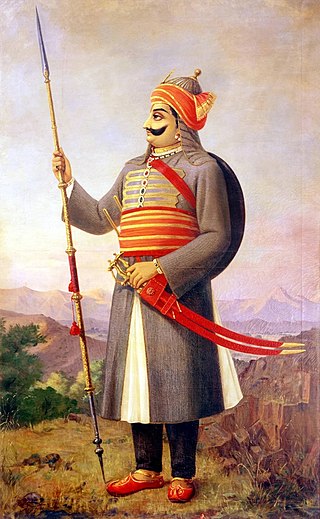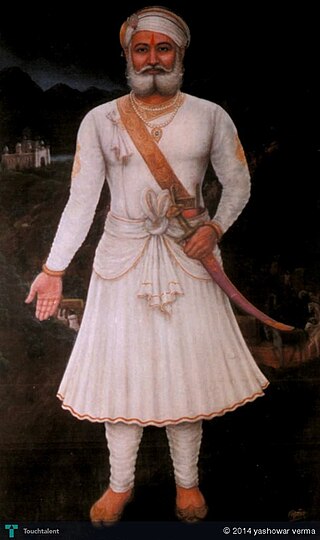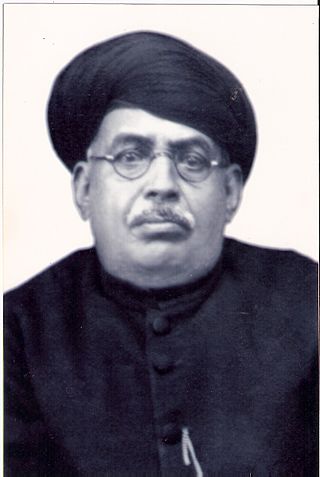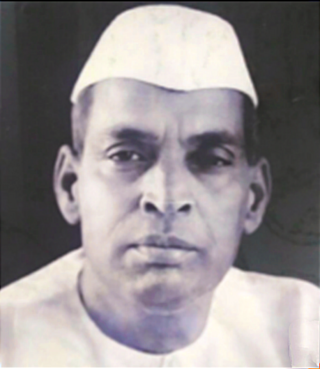
Pratap Singh I, popularly known as Maharana Pratap, was a king of Kingdom of Mewar, in north-western India in the present-day state of Rajasthan. He is notable for leading the Rajput resistance against the expansionist policy of the Mughal Emperor Akbar including the Battle of Haldighati and the Battle of Dewair.

Mohan Lal Sukhadia was an Indian politician, who served as the Chief Minister of Rajasthan state for 17 years (1954–1971). He became chief minister at the age of 38 and was responsible for bringing major reforms and developments in Rajasthan. For this, he is still widely revered as the "founder of modern Rajasthan".

Bhama Shah (1547–1600) was a noted general, minister and close aide of Maharana Pratap Singh. The financial support provided by him allowed Maharana Pratap to restore his army and reclaim much of his lost territory.

Gaurishankar Hirachand Ojha, born in Rohida village of Sirohi District, was a historian from the Indian state of Rajasthan. A prolific author, he wrote several books on the history of Rajasthan and other historical subjects. Subsequent historians from Rajasthan have referred to him as Guruvara Mahamahopadhyaya. Ojha regarded Kaviraj Shyamaldas as his guru and worked under him as assistant secretary of the historical department, Udaipur

Manikya Lal Verma was a member of Constituent Assembly of India in 1949. He was prime minister of Rajasthan, India before full formation of the state. He was elected to Lok Sabha in 1957 from Chittorgarh and in 1952 from Tonk. He was recipient of Padma Bhushan in 1965.

Kalu Lal Shrimali was the Union Education Minister for the Government of India and also a distinguished parliamentarian and an educationist.

The Kingdom of Mewar was an independent kingdom that existed in the Rajputana region of the Indian subcontinent and later became a major power in medieval India. The kingdom was initially founded and ruled by the Guhila dynasty followed by the Sisodiya Dynasty. The kingdom came to be known as the Udaipur State after it became a princely state in the nineteenth century.

City Palace, Udaipur is a palace complex situated in the city of Udaipur in the Indian state of Rajasthan. It was built over a period of nearly 400 years, with contributions from several rulers of the Mewar dynasty. Its construction began in 1553, started by Maharana Udai Singh II of the Sisodia Rajput family as he shifted his capital from the erstwhile Chittor to the newfound city of Udaipur. The palace is located on the east bank of Lake Pichola and has several palaces built within its complex.

Jag Mandir is a palace built on an island in the Lake Pichola. It is also called the "Lake Garden Palace". The palace is located in Udaipur city in the Indian state of Rajasthan. Its construction is credited to three Maharanas of the Sisodia Rajputs of Mewar kingdom. The construction of the palace was started in 1551 by Maharana Amar Singh, continued by Maharana Karan Singh (1620–1628) and finally completed by Maharana Jagat Singh I (1628–1652). It is named as "Jagat Mandir" in honour of the last named Maharana Jagat Singh. The royal family used the palace as a summer resort and pleasure palace for holding parties. The palace served as a refuge to asylum seekers for one occasion.

Lake Pichola, situated in Udaipur city in the Indian state of Rajasthan, is an artificial fresh water lake, created in the year 1362, named after the nearby Picholi village. It is one of the several contiguous lakes, and developed over the last few centuries in and around the famous Udaipur city. The lakes around Udaipur were primarily created by building dams to meet the drinking water and irrigation needs of the city and its neighbourhood. Two islands, Jag Niwas and Jag Mandir are located within Pichola Lake, and have been developed with several palaces to provide views of the lake.

Kan Singh Parihar was a Judge of Rajasthan High Court and Vice Chancellor of University of Jodhpur.

C. P. Joshi is an Indian politician and a five-time MLA from Nathdwara, Rajasthan. He was born in a Brahmin family in Nathdwara, Rajasthan and he is a member of the Indian National Congress. He has previously served as Speaker of the Rajasthan Legislative Assembly. Previously, he was the Member of Parliament of India from Bhilwara in the 15th Lok Sabha. He was one of the first 19 members of India's new cabinet sworn in on 22 May 2009, despite being a first-time member of the Lok Sabha. As a union minister, Joshi held key portfolios like Road Transport and Highways, and Rural Development and Panchayati Raj in the Second Manmohan Singh ministry. Moreover, he was also a Cabinet Minister of the Government of Rajasthan from 1998 to 2003.

Seva Mandir is an Indian grassroot NGO based in Udaipur, in Rajasthan state, founded by Dr. Mohan Sinha Mehta in 1968. Seva Mandir works mainly in natural resource development and sustainability, village development, women empowerment, education and health care, continuing education, and children's welfare.

Dungarpur State was a princely state during the British Raj. Its capital was the city of Dungarpur in the southernmost area of present-day Rajasthan State in India. In 1901 the total population of Dungarpur State was 100,103, while that of the town was 6,094.
Peepal Khoont mainly known as Pipalkhunt is a village, Tehsil headquarter and Panchayat Samiti of the Pratapgarh district of Rajasthan state. It is a sub-division among the 5 sub-divisions of the Pratapgarh district. The main market is called Sadar Bajar. It is situated on National Highway 113. Pipalkhunt is a town located on the Banswara - Jaipur Expressway surrounded by the hills, plants and trees. The town is situated on the bank of the Mahi River.
Vidyadhar Shastri (1901–1983) was a Sanskrit poet and a scholar of Sanskrit and Hindi. He was born in the city of Churu in Rajasthan (India), received the degree of Shastri from Punjab University (Lahore), a Master of Arts in Sanskrit from the University of Agra and resided at the city of Bikaner during the bulk of his scholarly and academic endeavours. In 1962, he was conferred the honour of Vidyavachaspati by the President of India.

Mewar Vibhuti, Pradhan Rai Pannalal Mehta (1843–1919) served four Maharanas, as Prime Minister of Mewar state in former state of Rajputana in India.














